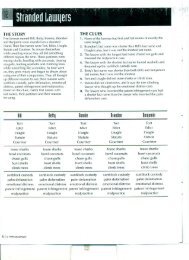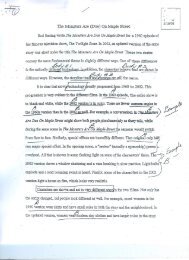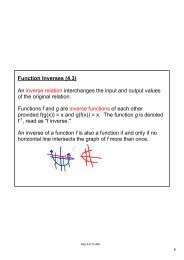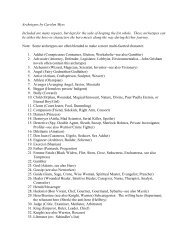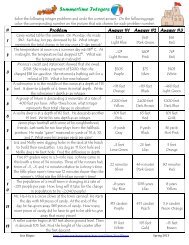Rosencrantz and Guildenstern Are Dead - Cherokee County Schools
Rosencrantz and Guildenstern Are Dead - Cherokee County Schools
Rosencrantz and Guildenstern Are Dead - Cherokee County Schools
You also want an ePaper? Increase the reach of your titles
YUMPU automatically turns print PDFs into web optimized ePapers that Google loves.
function as ours does.<br />
The only other option would seem to be Sartre's. That is, if we cannot know anything of what lies outside the<br />
mead-hall, then in effect nothing lies outside it <strong>and</strong> we had better attend to the business of making choices for<br />
the only life we can be sure of. Therein, says Sartre famously, we will find <strong>and</strong> exercise the only meaningful<br />
freedom, to which we are condemned.<br />
Obviously Stoppard does not twist our arms to force us into buying one of these views in isolation from the<br />
others. He does, however, force us to consider or reconsider all of them. More strikingly, as he dissolves the<br />
form-content dichotomy, he creates an illusion of oneness, of ultimate inseparability, among life on stage, life<br />
in the wings, <strong>and</strong> life out front. Whatever this life is, we are clearly all in it together, mirrors <strong>and</strong> all, jokes or<br />
no jokes. We laugh a great deal at Stoppard's humorous ingenuity, but we eventually experience our modern<br />
middle-class human unity with Elizabethan-Danish royalty <strong>and</strong> two movingly klunky courtiers. We're all<br />
afraid to die, especially without being sure of why we've lived. In the end do we submit fatalistically to our<br />
death, or do we freely choose to embrace it? And how are we to contemplate <strong>and</strong>—in Stoppard's case—express<br />
the difference?<br />
Source: Joseph Hynes, "Tom Stoppard's Lighted March" in the Virginia Quarterly Review, Vol. 71, no. 4,<br />
Autumn, 1995, pp. 643-47<br />
Review of <strong>Rosencrantz</strong> <strong>and</strong> <strong>Guildenstern</strong> are <strong>Dead</strong><br />
It is not only Hamlet who dies in Hamlet. They also serve who only st<strong>and</strong> <strong>and</strong> wait. Tom Stoppard's play<br />
<strong>Rosencrantz</strong> <strong>and</strong> <strong>Guildenstern</strong> are <strong>Dead</strong>, which opened last night at the Alvin Theater, is a very funny play<br />
about death. Very funny, very brilliant, very chilling; it has the dust of thought about it <strong>and</strong> the particles glitter<br />
excitingly in the theatrical air.<br />
Mr. Stoppard uses as the basis for his play a very simple yet telling proposition; namely that although to<br />
Hamlet those twin-stemmed courtiers <strong>Rosencrantz</strong> <strong>and</strong> <strong>Guildenstern</strong> are of slight importance, <strong>and</strong> that to an<br />
audience of Shakespeare's play they are little but functionaries lent some color by a fairly dilatory playwright,<br />
<strong>Rosencrantz</strong> <strong>and</strong> <strong>Guildenstern</strong> are very important indeed to <strong>Rosencrantz</strong> <strong>and</strong> <strong>Guildenstern</strong>.<br />
This then is the play of Hamlet not seen through the eyes of Hamlet, or Claudius, or Ophelia or Gertrude, but<br />
a worm's-eye view of tragedy seen from the bewildered st<strong>and</strong>point of <strong>Rosencrantz</strong> <strong>and</strong> <strong>Guildenstern</strong>.<br />
We first see them on a deserted highway. They have been summoned to the King's palace; they do not<br />
underst<strong>and</strong> why. They are tossing coins to pass the time of day. The ordinary laws of chance appear to have<br />
been suspended. Perhaps they have been. Destiny that has already marked out Hamlet for such a splendid,<br />
purple satin death, is keeping a skimpy little piece of mauve bunting for poor Guildenstem <strong>and</strong> gentle<br />
<strong>Rosencrantz</strong>. They are about to get caught up in the action of a play.<br />
Their conversation, full of Elizabethan school logic <strong>and</strong> flashes of metaphysical wit, is amusing but<br />
deliberately fatuous. <strong>Rosencrantz</strong> <strong>and</strong> Guildenstem are fools. When you come to think of it, they would have<br />
to be. Otherwise they might have been Hamlet.<br />
As they talk, the suspicion crosses the mind (it is a play where you are encouraged to st<strong>and</strong> outside the action<br />
<strong>and</strong> let suspicions, thoughts, glimmers <strong>and</strong> insights criss-cross your underst<strong>and</strong>ing) that Mr. Stoppard is not<br />
only paraphrasing Hamlet, but also throwing in a paraphrase of Samuel Beckett's Waiting for Godot for good<br />
measure. For this is antic lunacy with a sad, wry purpose.<br />
Review of <strong>Rosencrantz</strong> <strong>and</strong> <strong>Guildenstern</strong> are <strong>Dead</strong> 17





